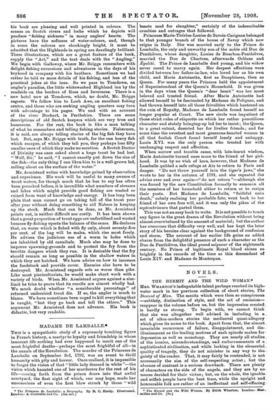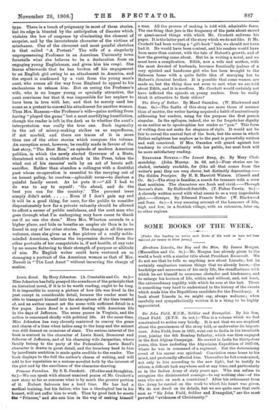NOVELS.
THE HERMIT AND 1111k, WILD WOMAN.* Mits. WHARTON'S indisputable talent perhaps reached its high.- water mark in her previous collection of short stories, The Descent of Man. The merits which were then so conspicuous —subtlety, distinction of style, and the art of omission—. reappear in the volume before us, but the impression created; is hardly as strong. To begin with, we cannot think that she was altogether well advised in including in a , set of ultra-modern stories the mediaeval quasi-allegory which gives its name to the book. Apart from that, the almost , invariable recurrence of failure, disappointment, and dis- illusionment as the leading motives of each episode makes for depression as well as monotony. They are nearly all studies of the ironies, misunderstandings, and embarrassments of a , sophisticated civilisation, and while lacking in the elemental, quality of tragedy, they do not minister in any way to the . gaiety of the reader. That, it may fairly be contended, is not necessarily the aim of the self-respecting artist ; but the• absence of contrast is a serious drawback. There are plenty of characters on the side of the angels, and they are by no. means derided for their virtue ; but, on the whole, the ignoble, and selfish people have the beat time, while the upright and honourable folk are rather of an ineffectual and self-effacing • The hermit and the Wild Woman. By Edith Wharton. London: Mao- millan and Co. [6s. J type. There is a touch of poignancy in most of these stories, but its edge is blunted by the anticipation of disaster which violates the law of suspense by eliminating the element of surprise, and by the invertebrate character of the victims of mischance. One of the cleverest and most painful sketches is that called " A Pretext." The wife of a singularly unprepossessing Professor in an American University town forestalls what she believes to be a declaration from an engaging young Englishman, and gives, him his conga. She learns afterwards that he has broken off his engagement to an English girl owing to an attachment in America, and the report is confirmed by a visit from the young man's aunt, who comes all the way from England to appeal to his enchantress to release him. But on seeing the Professor's wife, who is no longer young or specially attractive, the aunt convinces her that it was impossible for her nephew to have been in love with her, and that he merely used her name as a pretext to conceal his attachment for another woman. Thus Mrs. Ransom—the Professor's wife—gains nothing from having " played the game" but a most mortifying humiliation, though the reader is left in the dark as to whether the aunt's interpretation was really the true one. Such ingenuity in the art of misery-making strikes us as superfluous, if not morbid, and there are traces of it in more than one of the other stories which compose the volume. An exception must, however, be readily made in favour of the last story, "The Best Man," an episode of modern American politics, in which the newly elected Governor of a State, threatened with a vindictive attack in the Press, takes the wind out of his enemies' sails by an act of heroic self- sacrifice. Rather than abandon a colleague with a doubtful past whose co-operation is essential to the carrying out of an honest policy, he resolves —spiendide verax—to disclose a painful family secret. As he puts it :—" All I had to do was to say to myself : Go ahead, and do the best you can for the country.' The personal issue simply didn't exist Even if I don't gain my end it will be a good thing, for once, for the public to consider dispassionately how far a private calamity should be allowed to affect a career of public usefulness, and the next man who goes through what I'm undergoing may have cause to thank me if no one else does." Here Mrs. Wharton ascends to a higher plane, and bids us breathe an ampler air than is to be found in any of her other stories. The change is all the more -welcome, since she gives us a fine picture of a really noble- minded American, whereas the impression derived from the other portraits of her compatriots is, if not hostile, at any rate by no means flattering to their strength of purpose or altitude of aim. No English writer could have ventured on so damaging a portrait of the American woman as that of Mrs. Newell in "The Last Asset" without incurring the charge of malice.



















































 Previous page
Previous page